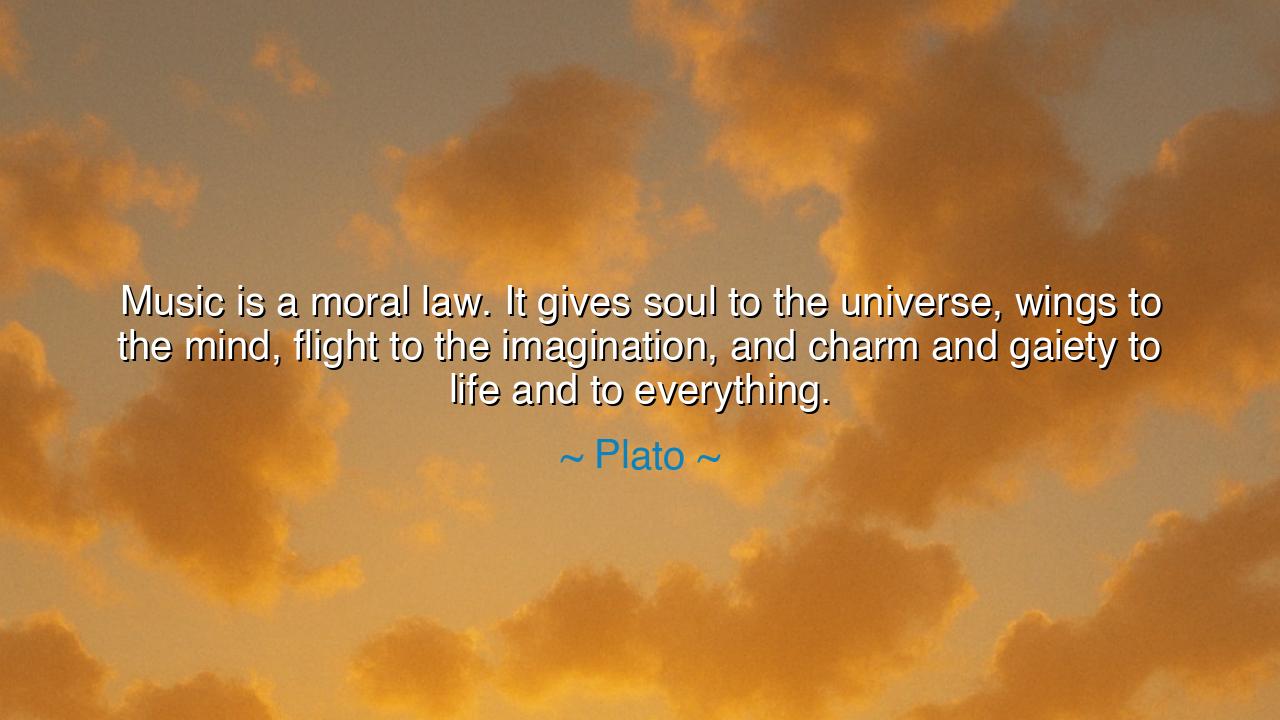
Music is a moral law. It gives soul to the universe, wings to the
Music is a moral law. It gives soul to the universe, wings to the mind, flight to the imagination, and charm and gaiety to life and to everything.






"Music is a moral law. It gives soul to the universe, wings to the mind, flight to the imagination, and charm and gaiety to life and to everything." Thus spoke Plato, the philosopher of light and harmony, whose words echo through centuries like the music he praised. To him, music was not mere sound—it was the pulse of the cosmos itself, the unseen rhythm that binds matter to spirit and order to chaos. He saw in it the breath of divine reason, the law that governs not through command but through beauty. For Plato, music is moral because it shapes the soul, tuning it toward virtue or dissonance, just as a lyre may be tuned to harmony or discord. It was not entertainment—it was education of the heart.
In the ancient schools of Greece, the teaching of music was sacred. Plato and his master Socrates believed that before a man could govern a city, he must first learn to govern the music of his own spirit. For melody and rhythm, they said, are the patterns of the divine order. If one lives in harmony with them, one becomes wise and just; if one lives in discord, chaos enters the soul. In this way, music was a mirror of the universe—the soul of the cosmos reflected in vibration and tone. It was the unseen mathematics of being, the bridge between thought and emotion, reason and wonder.
When Plato says that music gives soul to the universe, he speaks of its power to awaken what lies dormant. Without music, the world would still move, but it would not live. It would have form but no feeling, sound but no meaning. Music breathes spirit into the silent geometry of creation, just as breath gives life to clay. And when he says that it gives wings to the mind, he speaks of imagination—the faculty that lifts thought beyond the limits of what is known. Through music, the mind learns to soar, to see patterns where none were seen before, to feel the eternal through the temporal.
This truth has echoed in every age. When Beethoven, deaf and broken, composed his Ninth Symphony, he proved what Plato had foreseen—that music is the soul’s defiance of limitation. Though he could no longer hear the sound of his own creation, he felt it within—the moral law of harmony burning in his heart. The notes that he could not hear still gave flight to the imagination of the world, awakening in mankind the memory of something greater than pain, something pure and eternal. In his silence, Beethoven showed that music is not of the ears, but of the spirit.
And indeed, music gives charm and gaiety to life and to everything. For what is joy without song, or sorrow without melody? From the cradle to the grave, the human heart beats in rhythm with unseen music. The lullaby that soothes the child, the hymn that lifts the congregation, the anthem that unites a nation—these are not mere compositions of notes, but expressions of the soul’s longing to belong to something infinite. Music teaches us to feel rightly—to temper anger, to strengthen courage, to awaken compassion. Thus it is a moral force, shaping not only individuals but civilizations.
Even the ancients believed that the stars themselves sang. Pythagoras, Plato’s forefather in thought, spoke of the “music of the spheres”—the harmony of planets moving through the heavens, each orbit a note in the divine symphony of existence. Though unheard by mortal ears, this celestial music was the pattern of order that governed all things. To live well, said Plato, is to align one’s own inner harmony with that cosmic rhythm—to live so that one’s thoughts, deeds, and emotions form a single, beautiful chord. For in this lies the essence of virtue: harmony between soul and world.
But when music is corrupted—when it appeals only to passion and chaos—it distorts the moral fabric of the listener. Plato warned that in the decay of music begins the decay of the state, for when people lose harmony within themselves, disorder soon follows in the world. Thus, we must listen wisely and create carefully, that our songs may uplift rather than degrade, inspire rather than numb. For as the music, so the soul; as the soul, so the life; as the life, so the world.
So, my children of rhythm and silence, take this teaching to heart: let music be your companion and your guide. Fill your days with harmonies that strengthen virtue and awaken peace. When your spirit falters, listen—not merely with your ears, but with your heart—to the music of the world: the rustle of leaves, the laughter of friends, the pulse of your own breath. In these sounds lives the moral law of the universe. And when you sing, when you create, let your voice join that eternal song, so that your life may give, as Plato said, soul to the universe, wings to the mind, and charm to all that is.






AAdministratorAdministrator
Welcome, honored guests. Please leave a comment, we will respond soon